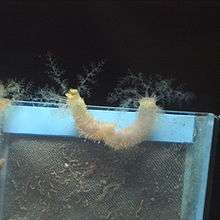Pseudocnus echinatus
Pseudocnus echinatus, formerly known as Cucumaria echinata, is a species of sea cucumber in the genus Pseudocnus.
| Pseudocnus echinatus | |
|---|---|
 | |
| Scientific classification | |
| Kingdom: | Animalia |
| Phylum: | Echinodermata |
| Class: | Holothuroidea |
| Order: | Dendrochirotida |
| Family: | Cucumariidae |
| Genus: | Pseudocnus |
| Species: | P. echinatus |
| Binomial name | |
| Pseudocnus echinatus (von Marenzeller, 1881)[1] | |
| Synonyms[1] | |
|
Cucumaria echinata | |
Pseudocnus echinatus is found in the Indo-Pacific from the Red Sea and Bay of Bengal to China and Japan.
Biology
Nearly all sea cucumbers are dioecious, with males and females being indistinguishable externally. Spawning takes place in this species between mid-June and early August, usually in the late afternoon. The gametes are liberated into the water column and fertilisation takes place at once. The larvae are planktonic at first before settling on the seabed, growing feeding tentacles and metamorphosing into juvenile sea cucumbers.[2]
Research
Pseudocnus echinatus has been researched as a possible source of bioactive molecules and has been found to contain a galactose-specific lectin with haemolytic activity.[3] This binds to the exterior of red blood cells, damaging the cell membrane and causing lysis. This lectin has the ability to block the development of Plasmodium, the causal agent of malaria, when it is expressed in genetically modified Anopheles mosquitoes.[4]
References
- Paulay, Gustav (2018). "Pseudocnus echinatus (von Marenzeller, 1881)". WoRMS. World Register of Marine Species. Retrieved 3 November 2018.
- Khanna, D.R. (2005). Biology of Echinodermata. Discovery Publishing House. p. 149. ISBN 978-81-7141-948-7.
- Matranga, Valeria (2005). Echinodermata. Springer Science & Business Media. p. 4. ISBN 978-3-540-24402-8.
- Yoshida S, Shimada Y, Kondoh D, et al. (2007). "Hemolytic C-type lectin CEL-III from sea cucumber expressed in transgenic mosquitoes impairs malaria parasite development". PLoS Pathog. 3 (12): e192. doi:10.1371/journal.ppat.0030192. PMC 2151087. PMID 18159942.